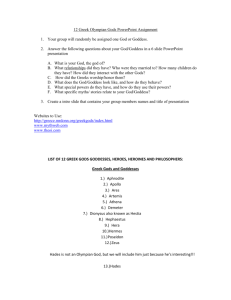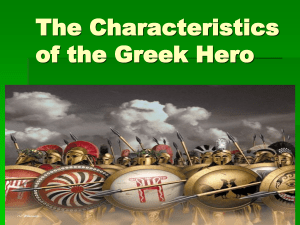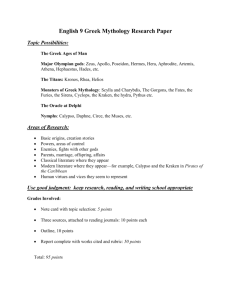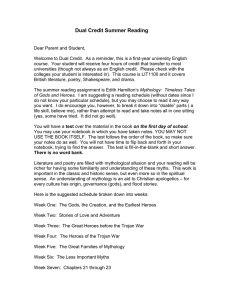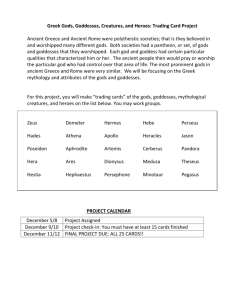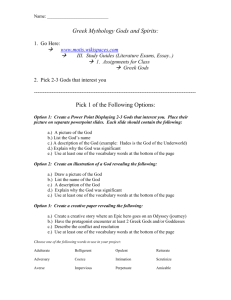Presentation
advertisement
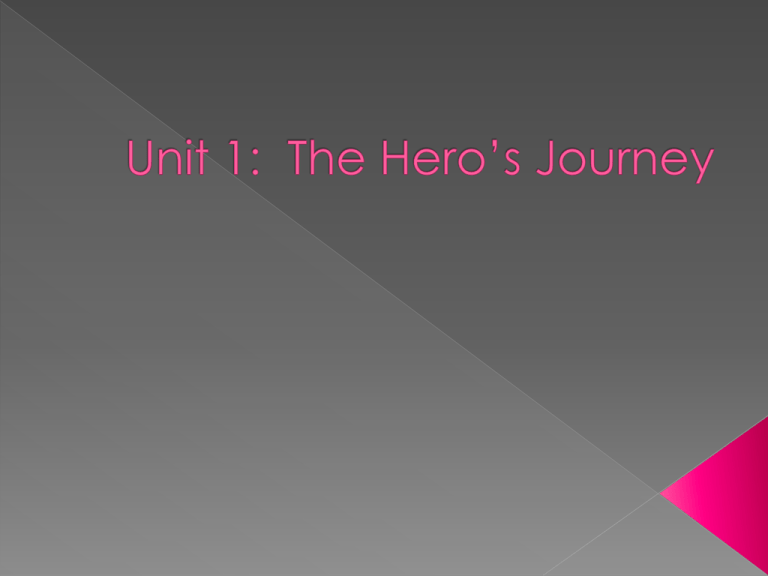
In at least four sentences, tell me who you consider to be a hero and why. Volunteer pass out Venn diagrams from last class . Objective: (The student will be able to): Understand the historical context of The Odyssey (ie. Greek Mythology) before we begin reading. Standard/Benchmark: CC910W7 – conduct short research projects to answer a question. Essential Question: Who were the most famous Greek mythological figures and what are they best known for? Page 8 Using your Venn diagram from last class, answer the following question in three sentences at the bottom. How are heroes and celebrities alike and how are they different? Celebrities v. Heroes PPT. http://www.60secondrecap.com/studyguide/homer-the-odyssey-context/ Partners are assigned a Greek god or goddess. 2. Answer the research questions as if you were playing the role of the God/Goddess assigned. 3. Come up with 1 of your own interview questions with answers. 4. Be prepared to perform your interview to the class. 1. Poseidon Hades Ares Athena Hermes Helios Hera Apollo Aphrodite Hestia Hephaestus Demeter Artemis Dionysis Eros Persephone Hebe http://www.greekmythology.com/, http://www.ancientgreece.co.uk/gods/ explore/exp_set.html, http://greekgodsandgoddesses.net/, and http://greece.mrdonn.org/greekgods/ 1 Needs Work Following Directions Quality of Research Creativity Team Work Presentation 2 3 4 5– Awesome ● The word mythology means the study of myths. ● The word mythology comes from the Greek word mythos, meaning story. ● Myths are stories with gods and goddesses that often provide supernatural explanations of how or why things happen in nature because the world had no explanation of how or why things happened in nature. (For example: lightning, formation of mountains) 1. To explain elements of nature (Example: how oceans were formed) 2. To explain the origins of good and evil (Example: why there is suffering in the world) 3. To teach valuable moral lessons about living (Example: lessons about controlling anger, etc.) 4. To explain human behavior (Example: understanding about love, jealousy, hate, etc.) 5. To explain ancient history (Example: beliefs of different cultures) 6. To express, as dreams do, the deepest fears and hopes of the human race. ● Presence of gods, goddesses, or supernatural creatures. ● Gods or goddesses dealing with humans or each other, especially to give a warning or a lesson. ● Supernatural events that provide an explanation for human behavior or natural phenomena. ● Setting: not always on earth (seems imaginary) ● Plot: external and internal conflicts ● Theme: usually several lessons within the story. Legends are believed to be based on historical events or real people. The focus is more on humans than on gods. ● Characters: people or gods in a story; gods are powerful but have human faults. ○ *Myths: heroes are usually ½ human and ½ god; superhuman powers ○ *Legends: heroes are human with no superpowers; gods often intervene and either help or hinder. ● A long, narrative poem that tells about the adventures of a hero that reflects the ideals and values of a culture. ● Epics are based on legends; they are not works of history but of the imagination. ● The Odyssey was composed sometime between 800-600 B.C. by a Greek poet named Homer. ● A larger than life figure, usually male, who embodies the ideas of a nation or race. ● These heroes take part in long, dangerous adventures and accomplish great deeds that require strength and courage. The epic hero goes on a journey: ○ ○ ○ ○ ○ usually in search of something. to reach a goal. to answer a question. to keep a promise. to solve a problem. ● Iliad and Odyssey ○ A. Composed in Greece around 800 B.C. ○ B. Were initially told orally and perhaps not written down until several generations later. ● Homer -a blind poet credited with writing the Homeric epics (Iliad and Odyssey) ● In The Odyssey, Odysseus is a hero that embodies some of the qualities that were honored in the Greek society, but he also naturally displays human faults. ● Poetic Meter of The OdysseyDactyllic/Heroic Hexameter Who was the most interesting god/goddess to you that we discussed? Explain your answer.
